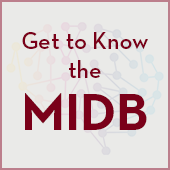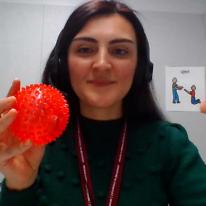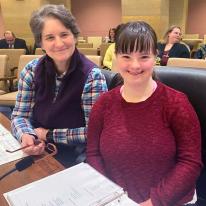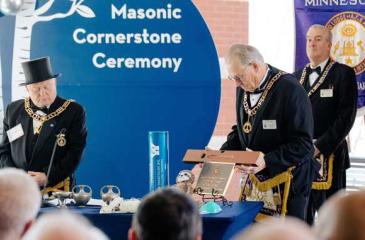The Synapse: April 2022
Celebrating the Transformational and Longstanding Partnership with Minnesota Masonic Charities
On March 20, the Minnesota Masons hosted a traditional cornerstone ceremony at the Masonic Institute for the Developing Brain. The event brought together Masonic Charities and Masons leaders from across the state, as well as leaders from MIDB, UMF and across the University in this historic and traditional ceremony. The event also provided an opportunity to recognize the Minnesota Masonic Charities and its support in establishing the MIDB.
Beginning with George Washington’s laying of the cornerstone for the U.S. Capitol building, Masons have been performing the cornerstone ceremony in cities across the United States for centuries. This beautiful dedication ceremony is the symbolic laying of the cornerstone, which supports the entire structure. The Masonic officers conducting the ceremony symbolically square, level, and plumb the cornerstone, assuring that it is set correctly. The Grand Master finishes the work by proclaiming the foundation stone “well formed, true, and trusty.”
Since the first gift of 500 silver dollars in 1956, the Freemasons and the Order of the Eastern Star, more recently through Minnesota Masonic Charities, have provided extraordinary support to the University of Minnesota. Minnesota Masonic Charities continues to be a steadfast partner and is the single largest donor to the University. Its $35 million gift to name the Masonic Institute for the Developing Brain has united under one roof world-leading expertise and a brighter future for children and adolescents.
View video of the Cornerstone Ceremony.

MIDB Colloquium: Save the Dates
The MIDB is pleased to announce the launch of a Get-to-Know-the-MIDB colloquium series, which will take place between May 26 and Aug. 25. This series will introduce the MIDB leadership team, core research services, clinic structure, and community engagement partners to the University community. We hope that you can attend! Presentations will be held on Thursdays at 4 p.m., followed by light refreshments and opportunities for socializing. The first presentation, to be held in person on May 26, will be hosted by MIDB Co-Directors Damien Fair and Michael Georgieff. A full schedule and location information will be posted to the website shortly.

Breaking Down Barriers to Behavioral, Neurodevelopmental, and Mental Health Needs Through Virtual Connection
For a rural Minnesota family with a child who has autism, it’s not unusual to wait two years for a clinical evaluation and intervention. That’s largely due to a shortage of care providers with the right expertise. Thankfully, the TeleOutreach Center at the MIDB is working to address such barriers—for behavioral, neurodevelopmental, and mental health needs. So instead of a long wait, a family can connect remotely with MIDB experts soon after an autism diagnosis, for example, to learn how to better communicate with their child—weeks or months before the first in-person visit. Read more about how the TeleOutreach Center is helping families.

First Study to Evaluate Neurobiological Predictors of Interpersonal Psychotherapy for Depressed Adolescents
In a new pilot study published in the Journal of Clinical Medicine, U of M researchers evaluated if the structure and function of the salience and emotion brain regions implicated in adolescent depression-specifically the amygdala and anterior cingulate cortex (ACC)-predict response to Interpersonal Psychotherapy for Depressed Adolescents (IPT-A). "Precision medicine approaches hold considerable promise, yet research on adolescents experiencing depression is far from being fully realized. In our study, we found a pattern of findings that highlights avenues worthy of further consideration," said Bonnie Klimes-Dougan PhD, an associate professor of psychology and co-leader of the RAD (Research in Adolescent Depression) Lab. "Personalized treatments or efforts to determine the optimal treatments for adolescents suffering from depression based on their neurobiological profile could represent a significant advance for our field." Read more about the study.

Building Momentum for Inclusive Higher Ed
Frustrated by the slow march toward inclusive higher education in their home state, two Minnesota parents of young adults with intellectual disability are creating buzz—and proposed state legislation—aimed at boosting inclusive academic options across the state. Sally Sexton (MNLEND 2020-21) and Mary Hauff, along with ICI Director Amy Hewitt and others, have formed the Minnesota Inclusive Higher Education Consortium (MIHEC), a group of students, families, education, state agency, and policy stakeholders. The group advised state legislators on the Minnesota Inclusive Higher Education Act, introduced recently, which would provide competitive grants to develop or enhance inclusive higher education initiatives and create a standards framework to ensure colleges and universities offer a high-quality education. Learn more about MIHEC’s work.

National Leadership in Developmental Origins of Health and Disease
Phu Tran, PhD, associate professor of Pediatrics and leader of MIDB’s Translational Neuroscience Core, was recently elected as president of the U.S. Developmental Origins of Health and Disease (DOHaD) Society. An affiliate of the International DOHaD Society, the U.S. DOHaD focuses on all facets of the study of the fetal origins and early life programming of health and disease. He will serve as president from April 2022 through March 2024. "The U.S. DOHaD Society is an important organization with many outstanding scientists and scholars who share similar values and research interests in children's health and development," said Tran. "This organization has been instrumental to my professional development as well as other junior investigators and trainees in similar fields of research. Following the footsteps of previous society leaders, I will devote my energy and effort to increase the society's membership as well as their engagement by highlighting topical research of its members and promoting the society's annual meetings with groundbreaking research and discovery." Read more about Tran’s leadership role.

ICD’s Developmental Psychology Program Ranked #1 in the Nation
The Institute of Child Development (ICD) has continued its longstanding ranking as the #1 developmental psychology program in the nation. ICD was rated along with other psychology programs as part of the 2023 U.S. News & World Report’s rankings of the Best Social Sciences and Humanities Schools. Specialty program rankings are based on nominations by education school deans and deans of graduate studies at education schools. The developmental psychology program works with PhD candidates pursuing degrees on the developmental science or developmental psychopathology and clinical science track. Students are prepared for careers in research, higher education, or applied research in developmental psychology. Learn more about the ranking.

Congratulations! NSF Graduate Research Fellowship Program Awardees
The National Science Foundation (NSF) Graduate Research Fellowship Program recognizes and supports outstanding graduate students in NSF-supported science, technology, engineering, and mathematics disciplines who are pursuing research-based master’s and doctoral degrees at accredited U.S. institutions. Congratulations to the following students on receiving this prestigious award.
- Vanessa Alschuler (advisor: Monica Luciana; Department of Psychology)
- Clarissa Filetti (advisors: Megan Gunnar and Ann Masten; Institute of Child Development)
- Felix Pichardo (advisor: Sylia Wilson; Institute of Child Development)
- Tori Siminec (advisor: Gail Ferguson; Institute of Child Development)
- Sally Stoyell (advisors: Katie Thomas and Jed Elison; Institute of Child Development)
- Hope Thilges (advisor: Megan Gunnar; Institute of Child Development)
Funding and Award Opportunities
- MIDB Interdisciplinary Faculty Research Awards: Application due by June 1
- MIDB Graduate Student and Postdoctoral Fellow Research Awards: Application due by June 1



